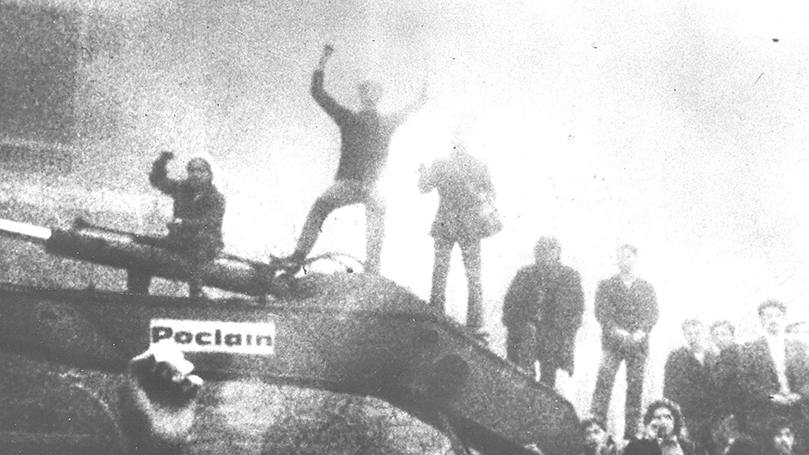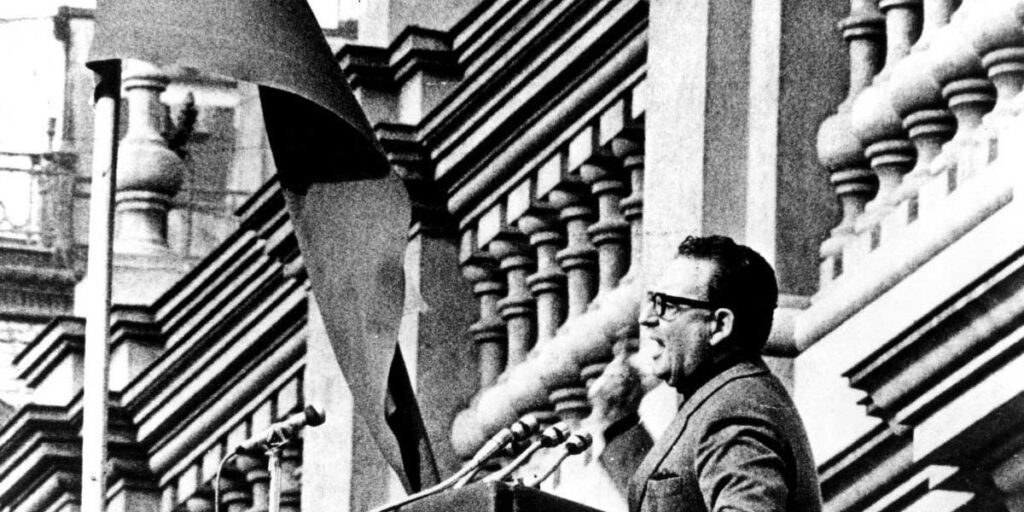The Battle of Chile is a powerful documentary highlighting the struggle of the Chilean people against imperialism leading up to the 1973 coup.
Author: Alex Ackerman
The Battle of Chile is a bold and visionary documentary that traces the historical development of the conditions that led to the 1973 coup that deposed Salvador Allende and installed fascist dictator Augusto Pinochet. Featuring interviews of ordinary Chilean people and footage of various mobilizations, strikes, and political speeches, the film spans the years of Allende’s presidency, showcasing firsthand the political maneuvers and social unrest caused by United States imperialism and the Chilean right-wing. Baring the reality of the struggle for the entire world to witness, The Battle of Chile captures a devastatingly important moment in history whose implications still reverberate in our current day.
Divided into three separate films, the documentary weaves together the threads of history, highlighting the social, political, and economic forces at play that facilitated the rise of fascism in Chile. In order to create a holistic understanding, Director Patricio Guzmán highlights not only important political figures, such as Allende and leaders of the right-wing parties, but also the testimonies and thoughts of working class people who were on the front lines of defending the government and building popular power.
The first part, The Insurrection of the Bourgeoisie, offers a bird’s eye view of the years preceding the 1973 coup, elucidating and contextualizing the conflict between Allende’s presidency and the legislature and judiciary controlled by the right. The film’s broad scope effectively provides insight into how the coup was not an isolated incident, but rather a last resort by the United States and the Chilean elite after years of attempted sabotage. For example, narrator Abilio Fernández informs the audience that 40 American agents in Chile instructed fascists groups to provoke violence and create social unrest, his voice interposted over footage of one such fascist group, Homeland and Freedom.

The second film, The Coup, similarly offers a broader scope beyond September 11, 1973. Specifically, it follows events from June of 1973, the day of the attempted coup, to the day of the successful coup and Allende’s death. In attempting to make an alliance with a centrist-right party, Allende granted concessions that ultimately resulted in more contradictions on the left, such as the need to balance international relations affecting Chile’s capital and the local needs of Chilean workers. Although the filmmakers present limited footage of the actual day of the coup, the imagery of the presidential office being bombed will haunt the viewer long after the screen goes dark.
Shifting slightly in focus from the first two films, People’s Power backtracks to 11 months before the coup, covering some material previously highlighted, recontextualizing the events with an emphasis on the Chilean working class and the evolution of class consciousness and strategy among the left. The various attempts to delegitimize Allende’s government were thwarted for so long by the organized efforts of the Chilean people, and the third film takes great care to give voice to the masses, including all of the tension and contradictions that arose out of the conflicts orchestrated by the right.
Guzmán and the rest of the crew never shy away from the action, remaining steadfast in the thick of tumultuous and dangerous moments, such as the attempted coup attempt by a small faction of military officers in June 1973. In fact, the first film concludes with an Argentinian crewmember filming his own death, as he was shot by one such officer participating in the failed insurrection to usurp Allende. Thus, the stakes of the struggle undertaken by the Chilean working class are rendered even more stark, as the ruthlessness of the fascist right is evidenced in this cold-blooded murder that implicates both filmmaker and viewer alike.
The Battle of Chile also creates such an impressive impact due to the magnitude of testimonies by Chilean working class people incorporated throughout all three films. They make clear that “Chile is suffering the aggression of North American imperialism” and that the root of manufactured chaos, exacerbated by economic boycotts by the United States, was “so that the people will turn against the government.” The film illuminates the incredible feats of mobilization and organization achieved by the workers, while also honoring the multitude of opinions and even disagreements about how the left should have proceeded in that particular historical moment.
The Battle of Chile remains one of the most powerful documentaries of the twentieth century, portraying history with a determined spirit that mirrors that of the Chilean people who stood up against fascism and imperialism. Like a fossil kept in amber, the film preserves the thoughts and actions of the people who comprised various factions during years leading up to Allende’s deposition and death, offering the viewer insight into the factors that influenced a specific moment whose ramifications would change the course of Chile’s history and present. The Battle of Chile not only details the past, but also provides a historical basis that can be applied to our own current moment, wherein people all over the world are currently making their own history.
A new 2K restoration of Patricio Guzmán’s The Battle of Chile will open on September 8, 2023, three days before the 50th anniversary of the coup in Chile, at BAM Rose Cinemas in New York City for a week-long run, followed by other cities. Read Alex Ackerman’s review of Theater Camp below!

